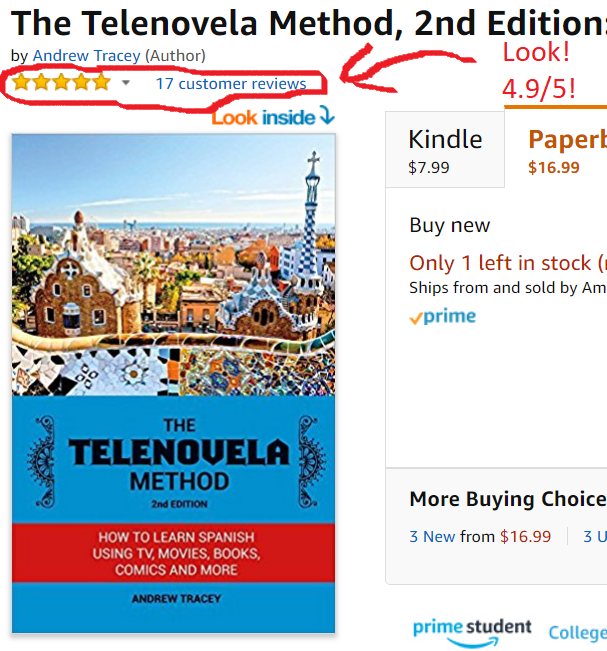 I love these “learn Spanish from ___” series I do, they’re great for generating short, quality blog posts when I’m equally short on ideas for new content, plus they’re immediately useful, quickly digestible, and direct, so people tend to like them.
I love these “learn Spanish from ___” series I do, they’re great for generating short, quality blog posts when I’m equally short on ideas for new content, plus they’re immediately useful, quickly digestible, and direct, so people tend to like them.
This one is going to be based on news and political TV shows from (at the moment) Spain that I watch on RTVE.es (highly recommended). I try to watch at least an hour of Spanish-language video every day and I usually just default to one of these programs with my morning coffee because it’s new content every day and RTVE is really easy to use and free. Plus, I like using such programs to learn languages because news presenters tend to be well-spoken without being “stiff” and you’re extremely unlikely to learn anything wrong, “low class / maleducado”, or that you shouldn’t say in polite company – you won’t pick up bad Spanish, in other words.
Today we’re just going to cover a few of the most common terms related to politics in Spain that I’ve been hearing over the last few months, this should really help you if you regularly watch the news from there:
- “Comparecencia” – This translates to English as “appearance” but it’s a very specific kind of appearance, that is one before a judge, court, or congress. Generally if you’re making a “comparecencia” (notice how often it’s used to mean “arraignment” or “hearing”) it’s because you’re being accused of doing something wrong, or are at least being questioned about something fishy. You don’t want to have to make a “comparecencia”, generally speaking.
- “Cohecho” – This is just the word the Spanish use to mean bribery. Bonus: a common slang term for this is “mordida“, which literally means “little bite”.
- “Prevaricación” – This one’s tougher as there’s no exact English equivalent. It means that someone in a position of government power and public trust abused that power and trust in some way. You could translate it as “breach of trust” or “betraying the public trust”.
- “Comicios” – Just another term for elections, which you’ll hear referenced a lot in Spanish news right now since there’s the very real possibility of a third election in December because they were unable to get things straightened out the first two times (for those familiar with how parliamentary democracies work: the elected representatives have been unable to agree on a head of parliament and so cannot form a government, nobody has enough votes to do it right now, and so Spain will automatically default to holding elections again and again until someone does).
- Prever, previsible, previsto – To predict, predictable, predicted. You’ll hear these three used fairly frequently. Note that “prever” is a verb and so there’s a whole conjugation you need to know.
- “Manifestación” – Protest or demonstration. There have been a lot of these in Spain lately, the most recent I can recall being for “La Diada”, the national day of celebration for Cataluña.
- “Impugnar” – To challenge or refute. Politicians do a lot of that it seems. Very common.
- “Imputar” – To accuse someone of something, to impute.
- “Votar en blanco” – Literally “to vote in white”, what this means is that you don’t fill in any of the choices on the ballot, or practically: you just don’t vote. It means to abstain from voting, which it’s said a lot of Spaniards will do if there are a third round of elections this December.
- “Abstención” – Abstention, to refrain from voting. Representatives in the Spanish Congress are doing this because they can’t politically afford to vote for whoever’s proposed for President (right now that’s Mariano Rajoy), many Spaniards are, as I said above, supposedly going to do it this December if there’s another election, etc.
- “Apostar por” – Literally it means “to bet for” but what it really means is “to opt for” or “to bet on”, meaning that somebody has chosen to do the following action. Very common to hear “so-and-so ha apuesto por…” or “Rajoy apuesta por…”, etc.
- “Dimitir” – To resign. I don’t need to explain why you’ll hear this a lot in political news.
- “Destituir” – To dismiss (nice way of saying “to fire somebody”). Again, same as above.
- “Pugna” – Fight or conflict. There are lots of “pugnas” in politics.
Had enough yet?
I have. There are tons more political terms but those are just some that came to mind for me as ones I’ve heard a lot lately, so I hope that helps you out. Future articles of this series will probably focus more on a specific story but I just thought we’d try this to get started. I hope that was interesting, let me know what you think in the comments (and would like me to write about in the future), also… If you thought the above was at all useful and you want to learn (or are learning) Spanish, please give me a chance and read what I have to say about my book below! Thank you so much for checking out my blog and I hope you’ve enjoyed my writing.
I learned to speak conversational Spanish in six months using TV shows, movies, and even comics: I then wrote a book on how you can, too
I have a whole method and a book I wrote about it called The Telenovela Method where I teach you how to learn Spanish from popular media like TV shows, movies, music, books, etc. that you can all find online for free. It was the #1 new release in the Spanish Language Instruction section on Amazon for nearly a month after it came out and currently has 17 reviews there with a 4.9/5 stars average. It’s available for $7.99-$9.99 for the e-book version depending on who you buy it from (Kindle version on Amazon is now $7.99) and $16.99 for the paperback (occasionally a bit cheaper, again, depending on who you buy it from).
It’s currently available in both e-book and paperback from:
Cheers,
Andrew







